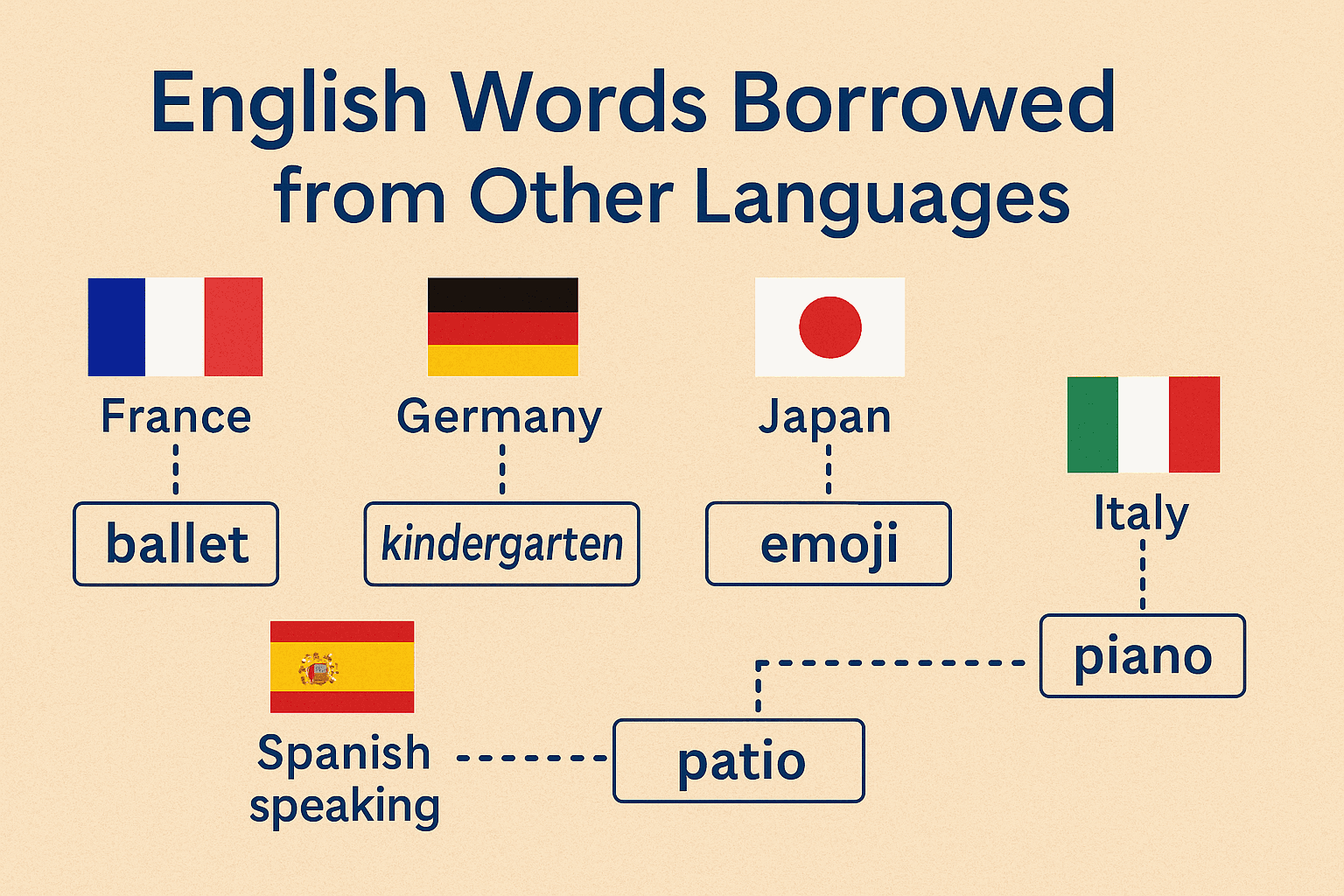Stunning Borrowed English Words You Must Know
English is often celebrated as a “borrowing” language, and for good reason. This linguistic melting pot has absorbed thousands of words from numerous languages through centuries of contact, colonization, trade, migration, and cultural exchange. In this article, we’ll delve into some of the most intriguing and widely used English words that have their origins in other languages, exploring their original meanings and how they have evolved over time.
The Reasons Behind English’s Rich Vocabulary
Unlike more regulated languages, such as French, English displays a remarkable openness to incorporating foreign terms. Several historical and cultural factors have contributed to this phenomenon:
– Invasions and Conquests: Historical events such as the Norman Conquest, the Viking invasions, and the Roman occupation introduced a plethora of new terms.
– Global Exploration and Colonialism: As British explorers ventured around the world, they brought back words from diverse cultures.
– Trade and Cultural Exchange: Interaction with different cultures through trade enriched English vocabulary.
– Modern Globalization: Contemporary advancements in technology and entertainment have facilitated the borrowing of terms, notably from popular culture.
As a result, over 60% of English vocabulary is rooted in Latin, French, Germanic languages, and beyond.
Words Borrowed from French
French has had a significant influence on English, especially post-1066 following the Norman Conquest. Some of the most captivating borrowed words include:
– Cuisine: Derived directly from cuisine, this term refers not only to cooking but also embodies a culinary style or tradition.
– Ballet: This word translates to a dance performance marked by grace and precision.
– Rendezvous: Meaning a meeting or appointment, this term helps illustrate the elegance of French origin.
– Fiancé: In English, this word refers to a person engaged to be married.
– Déjà Vu: A unique term capturing the eerie feeling of having witnessed something before.
Interestingly, nearly 30% of English words are estimated to be of French origin.
The German Influence
German has contributed several expressive and technical terms, enriching the emotional landscape of the English language. Highlighted words include:
– Angst: A deep feeling of anxiety or dread.
– Kindergarten: Literally means “children’s garden,” representing the early stages of education.
– Wanderlust: A compelling desire to travel and explore the world.
– Blitz: Originally referring to a military strategy, it now also describes a fast, overwhelming attack in various contexts, including sports.
– Doppelgänger: This fascinating term denotes a ghostly double or look-alike.
These words maintain much of their original emotional depth and nuance, reflecting a strong cultural connection.
Italian Contributions
Italian has significantly enriched English vocabulary, particularly in music, culinary arts, and literature. Key terms include:
– Piano: This musical instrument has its roots firmly planted in Italian craftsmanship.
– Pizza: A beloved dish worldwide, this flatbread topped with various ingredients embodies Italian culinary genius.
– Opera: Reflecting the dramatic art of vocal performances, this word is synonymous with sophistication and emotion.
– Graffiti: This term for wall writings brings an artistic flair to urban landscapes.
– Solo: A performance done alone, showcasing individual talent.
The Italian influence remains robust in both culinary and artistic contexts.
Rich Borrowings from Spanish
English has adopted numerous everyday words from Spanish, particularly in the Americas. Some noteworthy examples include:
– Canyon: Taken from cañón, it depicts a deep valley or gorge carved by water.
– Patio: An outdoor courtyard that invites leisure and relaxation.
– Rodeo: A lively cattle roundup or exhibition that showcases horsemanship and skill.
– Tornado: A swirling storm known for its destructive capabilities.
– Mosquito: Translated as “little fly,” this pesky insect has a significant presence across various ecosystems.
Spanish vocabulary continues to enrich English, especially in the United States, reflecting the influence of diverse cultures.
Japanese Influence in Pop Culture
In the modern age, Japanese words have permeated English, primarily through technology and pop culture. Examples include:
– Sushi: A culinary staple featuring vinegared rice, often paired with fish or vegetables.
– Tsunami: Translated as a large sea wave created by underwater disturbances.
– Karaoke: A popular activity where individuals sing along to instrumental music.
– Emoji: A pictograph that has changed the way we communicate visually.
– Samurai: The term for the noble warrior class denotes honor and skill.
The adoption of these words showcases the significance of Japanese culture in today’s interconnected world.
Arabic Contributions
Arabic has provided English with many terms used in mathematics, science, and trade. Some key words include:
– Algebra: Originating from al-jabr, this term signifies a mathematical method.
– Alcohol: Developed from al-kuḥl, referring to distilled substances.
– Zero: Coming from ṣifrn, this numeral revolutionized mathematics.
– Saffron: Derived from za‘farān, a spice derived from crocus flowers.
– Lemon: From laymūn, representing a popular citrus fruit.
Arabic contributions highlight the language’s historical significance across various disciplines.
The Impact of Indigenous Words
Indigenous languages, particularly those from the Americas and Australia, have also lent words to English. Notable examples include:
– Barbecue: From the Taíno word for outdoor cooking methods.
– Canoe: Originating from the Arawakan term for a small boat.
– Hammock: A delightful hanging bed, also from the Taíno language.
– Kangaroo: The term from Guugu Yimithirr describes a unique marsupial native to Australia.
– Toboggan: Derived from Algonquian, representing a traditional sled.
These words demonstrate the rich cultural heritage and contributions of indigenous people to the English language.
Are Borrowed Words Truly Foreign?
Over time, many borrowed words become naturalized in English, meaning they are seamlessly integrated into everyday usage. This evolution includes:
– Changes in spelling or pronunciation, such as how fiancé has become widely accepted.
– Their inclusion in dictionaries as standardized terms.
– Usage by native speakers without the need for translation, solidifying their place in the language.
Consequently, these words are now part of what we recognize as English vocabulary.
Final Thoughts
The English language is a captivating mosaic of borrowed words, each term encapsulating a piece of history, culture, and perspective from around the world. Whether you’re savoring sushi, admiring graffiti, or sharing an emoji, you’re engaging with a rich tapestry of languages without even realizing it. So, the next time someone claims that English is a “pure” language, you can confidently respond, “That’s a bit of codswallop.”
Did you know that nearly 80% of English vocabulary comes from other languages? From the French elegance of ballet to the spicy Indian bungalow, English is a patchwork of global influence. According to Mondly’s fascinating article on borrowed words, many of the terms we use every day trace back to Latin, French, German, Arabic, Japanese, and even Hindi. Each borrowed word carries a tiny piece of another culture — proof that English is one of the most globally connected languages in the world.
Brand Name Generator | Free Name Generator | Fantasy Name Generator



